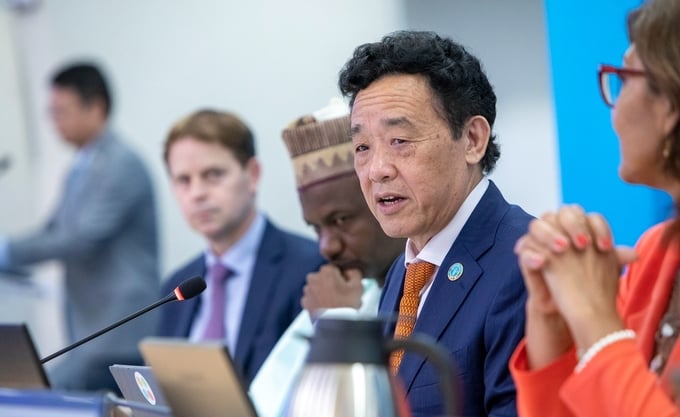May 24, 2025 | 16:20 GMT +7
May 24, 2025 | 16:20 GMT +7
Hotline: 0913.378.918
May 24, 2025 | 16:20 GMT +7
Hotline: 0913.378.918

FAO Director-General QU Dongyu during the 12th Session of the Plenary Assembly.
The Global Soil Partnership, bringing together hundreds of diverse actors focused on improving the health of our soils to promote healthier and more resilient agrifood systems, opened a key meeting today with a call for urgent action to meet its objectives amid a range of complex crises.
Hosted by the Food and Agriculture Organization of the United Nations (FAO) and including FAO Members and over 700 partners, together “we champion a vision of a world in which soils are healthy and resilient, ensuring the sustained provision of ecosystem functions and services for all, leaving no one behind,” FAO Director-General QU Dongyu said in opening remarks to the Partnership’s 12th Plenary Assembly, highlighting the need to ensure sustainable soil management based on the three “Rs”: reduce, re-use, and renew.
The Global Soil Partnership is committed to improve and maintain the health of at least 50 percent of the world's soils by 2030, an ambitious and urgent target that demands political will, cooperation and investment, Qu noted.
Among the sessions during first day of the three-day gathering will be an event hosted by the US Department of State focusing on its Vision for Adapted Crops and Soils (VACS), aimed at creating a resilient food system through the promotion of diverse, nutritious, and climate-adapted crops grown in healthy, fertile soils.
Under the VACS initiative, FAO is implementing the Soil Mapping for Resilient Agrifood Systems (SoilFER) project in Central America and African countries. The project stands out as a unique framework aimed at unearthing valuable information from soils to guide policymaking and fertilizer recommendations both at national and field scale.
Thailand’s Land Development Department and World Soil Day Association will host an event showcasing success stories of Thailand and other countries through policy actions promoting sustainable soil management practices that are context-specific, locally adapted and culturally suitable.
Other topics include Measuring, Reporting and Verifying systems related to soil health; implementing a Global Soil Laboratory Network (GLOSOLAN) quality certificate for carbon analytical results on soil samples; Conservation Agriculture, the management of Water and Soil Organic Carbon against soil erosion and for food security and the role of healthy soils in agrifood systems transformation.
Amid increasingly complex crises - from climate change and natural resources degradation to pollution and conflicts driving food insecurity and famine, agriculture holds powerful solutions, the FAO Director-General said. But urgent action is needed to transform our agrifood systems to be more efficient, inclusive, resilient and sustainable.
“Soil is the foundation of our agricultural systems, the home of biodiversity, and the ‘green water’ reservoir for our plants,” Qu said, appealing to Members and resource partners to invest more in soil health and in the Partnership.
The Global Soil Partnership was established in December 2012 to position soils on the Global Agenda, promote inclusive policies and soil governance as well as sustainable soil management, by bringing together multiple stakeholders. The partnership hosted by FAO Its achievements include: the establishment of an Intergovernmental Technical Panel on Soils and related international networks for different soil matters; the proposal for and annual celebration of UN World Soil Day (5 December) and the International Year of Soils 2015; endorsement of the revised World Soil Charter; production of the Status of the World’s Soil Resources 2015 report; Technical guidelines on soils for nutrition; establishment of Regional Soil Partnerships and development of Voluntary Guidelines for Sustainable Soil Management.
(FAO)

(VAN) Alt Carbon has raised $12 million in a seed round as it plans to scale its carbon dioxide removal work in the South Asian nation.

(VAN) Attempts to bring down the price of the Japanese staple have had little effect amid a cost-of-living crisis.

(VAN) Fourth most important food crop in peril as Latin America and Caribbean suffer from slow-onset climate disaster.

(VAN) Shifting market dynamics and the noise around new legislation has propelled Trouw Nutrition’s research around early life nutrition in poultry. Today, it continues to be a key area of research.

(VAN) India is concerned about its food security and the livelihoods of its farmers if more US food imports are allowed.

(VAN) FAO's Director-General emphasises the need to work together to transform agrifood systems.

(VAN) Europe is facing its worst outbreak of foot-and-mouth since the start of the century.